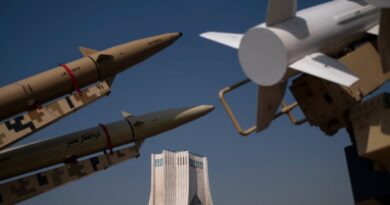Russian spy ship warning: ‘This is how Putin seeks revenge on UK!’ | World | News

The Yantar, shadowed by Royal Naval vessels (Image: MoD)
Vladimir Putin has sent his spy ship into the seas around the UK to map vital undersea cables and other important infrastructure as a naval expert warns “this is how Russia will take revenge on the UK.”
Iain Ballantyne was speaking after Royal Navy vessels HMS Iron Duke and tanker RFA Tideforce shadowed a total of three Russian vessels, led by new frigate Admiral Golovko, through the English Channel.
However, while two of the vessels continued heading south, the third, Yantar, then took a different course, north through the Irish Sea, briefly making her presence public by turning on her Automatic Identification System (AIS).
Mr Ballantyne, the editor of Warships International Fleet Review magazine, told Express.co.uk: “Undersea sabotage and espionage is an area of Russian naval activity in which they currently have a considerable edge over the UK and likely NATO overall.
“While the West might deride Moscow’s knackered, rather ancient – currently marooned in refit – aircraft carrier Kuznetsov, the vessels it should be watching very closely are the Yantar plus other, older so-called ‘scientific research’ vessels.”

The Yantar showed its position in the Irish Sea by switching on its Automatic Identification System (Image: Google)
Two more Yantar Class vessels would join the Russian Navy soon, so there was more trouble ahead, Mr Ballantyne cautioned.
As for what Yantar is up to, he continued: “A major focus of their activities must be surveying the seabed to potentially map infrastructure such as energy pipelines and communication cables that be attacked when the Kremlin orders.
“Yantar can deploy deep diving submersibles and also Remotely-operated Vehicles.
“And if Russia is to take revenge one day for the UK and other NATO nations assisting Ukraine in its fight for survival, then it will possibly be via unseen activities like seabed sabotage. Russia is already suspected of doing such things since the 2022 invasion of Ukraine.”

HMS Iron Duke and tanker RFA Tideforce shadowed Admiral Golovko in the English Channel (Image: MoD)
The most interesting aspect of Yantar’s current activities was the fact that she deployed from her Arctic home base along with Admiral Golovko, which is armed with hypersonic missiles, Mr Ballantyne pointed out.
He added: “As Golovko and a fleet tanker continued south, Yantar headed off to the Irish Sea, one of the most sensitive areas of British naval activity. Trident missile submarines of the Royal Navy exit and return to HM Naval Base Clyde, which is not far to the north of where Yantar has been loitering. Royal Navy attack submarines operate from the same Clyde base.
The array of naval and air assets deployed by the UK to watch Yantar, Golovko and other Russian naval vessels in recent days was a clear indication that the MoD was “rising to the challenge of a serious provocation”, Mr Ballantyne stressed.
He said: “Yantar has been monitored by a P-8 Maritime Patrol Aircraft of the RAF and a mine-hunter, HMS Cattistock.
“The Royal Fleet Auxiliary unit Proteus, first of the UK’s new seabed infrastructure defence vessels, has been on trials in waters off the Clyde.
“At least two British frigates and possibly even submarines, with three of the latter currently claimed to be at sea, have been available for monitoring duties too.
Our adversaries should be in no doubt of our steadfast determination and formidable ability to protect the UK.
The Royal Navy and RAF have once again shown they stand ready to defend our country at a moment’s notice. https://t.co/1Vgh5YNEan
— Luke Pollard MP (@LukePollard) November 15, 2024
“The Irish have been reportedly keeping an eye on Yantar, which comes at a time when the poor state of Ireland’s defences against such interlopers has been a subject of much heated debate.”
Bryden Spurling, Senior Research Leader, Defence & Security at RAND Europe, emphasised that Western shadowing of Russian military flights and naval transits near the territory of Western nations was standard practice and has been a feature of the European theatre, in the northern Pacific around Alaska, and even down near Australia, for decades.
He added: “Russia has many reasons for conducting these. Sometimes it’s for reconnaissance or to make a statement, sometimes it’s to test Western responses. And sometimes it’s a simple feature of Russia’s geography – any transfer of vessels to Russian bases in the Baltic Sea will invariably route past a number of Western countries.
“While it’s important for Western nations to shadow these transits as a demonstration of their own response capability, in and of itself they’re not usually something to be very concerned about.”
Nevertheless, he stressed: “That said, NATO will be particularly keen to monitor the movements of a vessel like the Yantar, with its reported capability to monitor and disrupt undersea cables.
“Intelligence agencies have been warning of the increased risk of acts of sabotage linked to Russia.
“Undersea cables can be an attractive target given their importance to modern economies and because it can be difficult to definitively attribute an attack to one actor or another. So that lends itself to deniability.”
Western politicians have raised serious concerns over reports that Russian ships and submarines have been monitoring critical undersea cables near the UK, which carry vast amounts of global internet and communications data.
These vital links are essential for the functioning of financial markets, international trade, and global connectivity.
Numerous politicians including former Defence Committee chairman Tobias Ellwood have warned that such activities could be a precursor to potential sabotage, aiming to disrupt Western economies and communication networks in times of heightened tensions.
Former UK Defence Secretary Grant Shapps and NATO officials have in the past highlighted the strategic vulnerability of these cables, with Mr Shapps describing their protection as “absolutely crucial to national and international security.”
The monitoring activity has prompted calls for increased naval patrols and investment in underwater surveillance to counter the threat.




